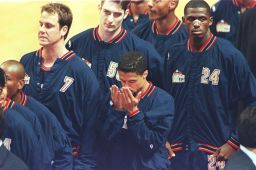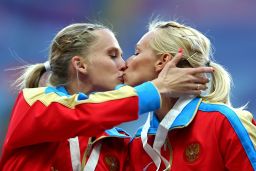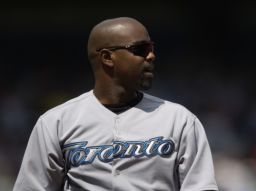Story highlights
A Denver Nuggets star saw his NBA career crumble after he sat during the anthem in 1996
An Ethiopian marathon runner crossed his arms at the Rio Olympics to protest the treatment of his people
From the howls of outrage emanating from some corners of the Twittersphere, you’d be forgiven for thinking that Colin Kaepernick’s stand (or rather, knee) against institutional racism in the US was the first time a sports venue had been used as a political platform.
And following USWNT and Seattle Reign star Megan Rapinoe’s decision Sunday to kneel in solidarity with the 49ers’ quarterback, it certainly won’t be the last.
We’re all familiar with the iconic protests of Muhammad Ali, stripped of his boxing license and world title for refusing to kill “no Viet Congs,” and the silent, impassioned raised arms of Tommie Smith and John Carlos on the medal stand at the 1968 Olympics in Mexico City. Baseball pioneer Jackie Robinson also used his many achievements to advance civil rights causes.
But recent sporting history is littered with protests, some subtle, others not so much. Here’s a look at some recent examples.
Mesut Ozil, Sami Khedira
Kaepernick’s refusal to honor the national anthem isn’t even the first time a country’s song has been at the center of a controversy.
German international footballers Mesut Ozil and Sami Khedira famously declined to sing the German national anthem ahead of national team matches, but they did join the lineup on the field. Ozil, ethnically Turkish but born and raised in Germany, instead recites verses from the Quran during the pre-match playing of the anthem.

In June, Frauke Petry, co-leader of the anti-immigration, far-right Alternative for Germany (AfD) party, slammed Ozil for his decision not to sing the anthem with his compatriots.
“It’s a pity Mesut Ozil, someone so many children and adolescents identify with, does not sing the national anthem,” German newspaper Die Welt quoted her as saying.
Germany coach Joachim Lowe defended his players. “Our boys identify totally with the national team and Germany, but one also has to consider their heritage,” he told tabloid Bild back in 2010.
Mahmoud Abdul-Rauf
Denver Nuggets star Mahmoud Abdul-Rauf courted criticism after he deliberately sat during the anthem before an NBA game in 1996. The move earned him a suspension from then-NBA commisioner David Stern and the scorn of a nation.

Abdul-Rauf and the NBA reached a compromise. He would agree to stand for the national anthem, but he would also be allowed to bow his head, close his eyes and recite a Muslim prayer.
But the damage to Abdul-Rauf’s career was done. The Nuggets traded him to the Sacramento Kings at the end of the season, where his playing time was greatly diminished, and by 2001 he was out of the NBA for good.
The surprising history behind Colin Kaepernick’s protest
Minnesota Lynx players
Members of the Minnesota Lynx, the reigning WNBA champions, wore Black Lives Matter T-shirts during warm-ups before a game in July against the Dallas Wings. The protest came right after the deaths of Alton Sterling and Philando Castile, two black men killed by police that month. The players told reporters that their shirts aimed to honor those who lost their lives, and to call for an end to racial profiling and senseless violence, CNN affiliate WCCO-TV in Minneapolis reported.
“Change starts with us. Justice & accountability,” the front of the shirts said. On the back, the T-shirts showed the names of Sterling and Castile. They also displayed the Dallas Police Department emblem and the phrase “Black Lives Matter.”
The move prompted several off-duty cops who were providing security for the Lynx game to walk off the job.
Feyisa Lilesa
Ethiopia’s Feyisa Lilesa crossed his arms at the finish line of the men’s marathon event at the Rio Olympics last month as a protest against the Ethiopian government’s crackdown on political dissent.
Striding across the finish line with his arms crossed over his head in a sign of solidarity for the Oromo people, his native group and the largest ethnic group in Ethiopia, after the race he said he wanted to draw attention to the government’s ongoing persecution of the group.
By speaking out, Lilesa said, he put himself into such danger that he couldn’t go home after the Games. “I really think that I would be killed,” he said – or imprisoned. Some of his family members are already in prison, he said, and he worries about the safety of his wife and two children.
2013-14 LA Clippers
After racist comments surfaced that were attributed to then-Los Angeles Clippers owner Donald Sterling, the team staged a silent protest. While warming up for an NBA playoff game, the players removed their warm-up shirts bearing team logos to reveal red T-shirts worn inside out, with the logos hidden. They finished warming up, removed the red shirts and played the game wearing their regular uniforms.
The comments came from recordings of Sterling talking to his then-girlfriend, V. Stiviano, and appeared to reflect Sterling’s embarrassment and frustration with Stiviano over her associating with African-Americans at Clippers games and for posting such pictures on her Instagram account.
Tatyana Firova and Kseniya Ryzhova
The Russian duo kissed each other after winning the women’s 4x400-meter relay final at the 2013 IAAF World Championships in Moscow, coming at a highly charged moment for gay rights in Russia, which had recently implemented an anti-gay propaganda law.

The law, which bars the public discussion of gay rights and relationships anywhere children might hear, at the time led to calls to boycott the 2014 Winter Olympics in Sochi.
Was it just a celebratory kiss? Or was it a political statement?
The athletes remained tight-lipped.
Carlos Delgado
Beginning in the 2004 season Toronto first baseman Carlos Delgado decided to no longer stand for “God Bless America” during the seventh inning stretch of Major League Baseball games. His silent protest went virtually unnoticed until he talked to the media about it in the middle of the season.

Delgado said he was protesting the 2003 US invasion of Iraq. “I don’t (stand) because I don’t believe it’s right,” Delgado told the Toronto Star in 2004. “I don’t believe in the war.”
When he started playing for the New York Mets in 2006, Delgado agreed to join his teammates and stand for the song.




